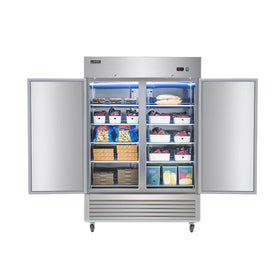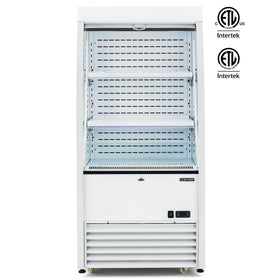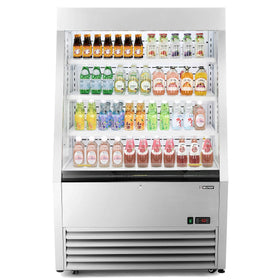When it comes to outfitting a commercial kitchen or retail space, having that little “UL-certified” mark stamped on your equipment might not seem like a big deal. But that symbol carries a lot more weight than most people realize.
Unfortunately, it's also surrounded by a fair amount of confusion in some places. Some people wrongly presume that UL certification is just about electrical safety, while others think it's a costly red tape hassle; there are plenty of myths floating around.
The risk with believing those myths is that you end up making poor equipment choices for your commercial kitchen equipment, struggling with high energy costs, and having headaches with regulatory authorities down the line.
We are cutting through the noise and breaking down the six biggest myths about UL certification—and setting the record straight on why it matters for your business.

Myth #1: UL-certified commercial refrigerators are too expensive.
UL certification does not automatically make a fridge more expensive. UL does charge a fee for initial product test, a follow-up fee, a markings fee, a certification fee, and other miscellaneous fees, but UL certification costs vary widely based on product complexity and testing requirements, and are not necessarily transferred to the customer in the form of high prices.
Moreover, UL certification means quality assurance, durability, and peace of mind, which,c considering the uncertainties and risks of running a commercial kitchen, most business owners would not mind paying a little more upfront for.
Also, consider that buying a UL refrigerator is often far more cost-effective in the long run. Here’s why
- UL testing ensures that the refrigerator meets strict safety and performance standards: there is a lower risk of electrical faults, fires, and breakdowns.
- UL-certified models tend to last longer and perform more consistently, meaning fewer repairs and replacements.
-
Insurance companies often favor UL-listed appliances, which could mean lower premiums.
So, is it worth buying a UL-certified commercial refrigerator even if it costs slightly more? Yes! Think of it as investing in reliability and safety, not just a price tag.

Myth #2: UL certification isn’t necessary for kitchens.
In many cases, a UL certification is not just necessary in a commercial kitchen—it’s required.
Commercial kitchens are high-risk environments: the combination of complex electrical equipment, heat, and moisture means that they are perpetually just one fire away from total disaster.
U.S fire departments report over 9,000 structural fires in eating and drinking establishments each year. In the four years between 2017 and 2021, these fires resulted in about 100 civilian injuries and over $175 million in direct property damage.
So, how does having a UL-certified commercial refrigerator help?
- UL certification proves the refrigerator has been tested for safe operation under commercial conditions.
-
Many insurance companies will refuse to offer an insurance policy without UL certification
Apart from the increased risk of fire outbreak, skipping UL certification might mean you fail inspections or void your insurance coverage. So, yes, it is actually required.
Myth #3: UL just tests electrical safety—it doesn’t matter for performance.
UL standards cover much more than just basic electrical safety. UL certifies commercial refrigerators under multiple categories, from mechanical construction to heavy-duty use to flammable refrigerant testing.
- UL 471, for example, covers mechanical construction, energy efficiency, and refrigerant safety.
- UL/IEC 60335-2-89 covers UL 412, the standard for refrigeration unit coolers for fire safety
In general, UL tests for extreme use conditions, ensuring the unit can handle heavy-duty kitchen traffic without overheating, leaking, or malfunctioning.
A UL-certified fridge isn’t just safe—it’s engineered to perform under pressure.
Myth #4: Any well-known brand is safe enough without UL.
Brand reputation doesn’t replace independent verification. Even popular brands may offer budget models without UL certification to cut costs. Just because a name is trusted doesn’t mean every product meets UL standards.
- UL certification is your objective proof of safety and durability.
- A non-certified unit, regardless of brand, can still be a liability in a commercial setting.
Trust the testing, not just the logo.
Myth #5: UL certification is only relevant in the U.S.—it doesn’t matter elsewhere.
UL is a globally recognized safety authority. While it's based in the U.S., UL standards are often accepted or respected in Canada, Europe, Asia, and other parts of the world.
UL has harmonized standards with organizations like CSA and CE.
If you’re operating internationally or importing/exporting kitchen equipment, UL certification can smooth regulatory approval.
UL gives your equipment global credibility and flexibility.
Myth #6: “If a fridge is working fine, certification doesn’t matter.”
That’s a dangerous gamble. Uncertified refrigerators may lack safeguards that protect against internal fires, gas leaks, or compressor failures. Just because it’s running today doesn’t mean it’s safe tomorrow.
Besides, many safety hazards in refrigeration systems—like electrical shorts, insulation failure, or refrigerant leaks—are invisible until it’s too late. You can't visually confirm thermal performance, wiring integrity, or flammability ratings.
- UL-certified appliances are designed with redundant safety mechanisms to prevent catastrophic failure.
- Accidents don’t give warnings—they just happen.
Getting UL certification is about being proactive, not reactive. UL fills in the gaps you can’t see. UL-certified refrigerators undergo extensive lab testing with sensors and protocols that aren’t visible to the naked eye.
Final Thoughts: Is UL certification worth it?
UL certification isn't a luxury—it's a safety net. It helps you avoid lawsuits, fire damage, health code violations, and insurance complications, all while ensuring your refrigerator performs reliably during the daily grind of commercial kitchen life.











